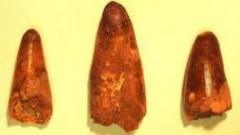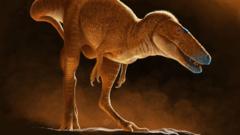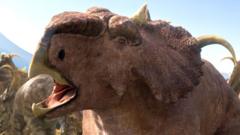In an unexpected find during a standard customs check, French officers seized nine dinosaur teeth believed to date back to the Late Cretaceous period, prompting an investigation into the origins and destination of these ancient relics.
French Customs Unearths Ancient Fossils During Lorry Inspection

French Customs Unearths Ancient Fossils During Lorry Inspection
Custom officials discover dinosaur teeth, including those belonging to a Mosasaurus, during a routine check near the Italian border.
French customs officers made a remarkable discovery during a routine inspection of a Spanish lorry on the A8 motorway, close to the Italian border on January 28. The officers found nine dinosaur teeth packed in two parcels, which they promptly sent for examination at a prehistory museum in Menton, a nearby city.
The surprising haul was confirmed by experts on Friday, who revealed that the teeth belonged to reptiles that lived approximately 72 to 66 million years ago in Morocco. Among the finds, one tooth was identified as belonging to a Zarafasaura oceanis, a marine reptile measuring around 3 meters (10 feet) long, first named in Morocco in 2011. Additionally, three of the teeth were attributed to the Mosasaurus, a massive aquatic reptile that reached lengths of up to 12 meters, while the remaining five teeth were linked to the Dyrosaurus phosphaticus, an ancient ancestor of modern crocodiles.
According to customs officer Samantha Verduron, lorries on the A8 route, frequently subjected to random checks, are often found carrying illegal drugs, making this fossil discovery an unusual and exciting event. The lorry driver's claim that he was transporting the parcels to recipients in Genoa and Milan has prompted French authorities to conduct further investigations to uncover the intended recipients of these ancient fossils.
While collecting fossils is generally legal, exporting them often necessitates a license, raising questions about the legalities surrounding this particular shipment and the broader implications for fossil trading within Europe.
The surprising haul was confirmed by experts on Friday, who revealed that the teeth belonged to reptiles that lived approximately 72 to 66 million years ago in Morocco. Among the finds, one tooth was identified as belonging to a Zarafasaura oceanis, a marine reptile measuring around 3 meters (10 feet) long, first named in Morocco in 2011. Additionally, three of the teeth were attributed to the Mosasaurus, a massive aquatic reptile that reached lengths of up to 12 meters, while the remaining five teeth were linked to the Dyrosaurus phosphaticus, an ancient ancestor of modern crocodiles.
According to customs officer Samantha Verduron, lorries on the A8 route, frequently subjected to random checks, are often found carrying illegal drugs, making this fossil discovery an unusual and exciting event. The lorry driver's claim that he was transporting the parcels to recipients in Genoa and Milan has prompted French authorities to conduct further investigations to uncover the intended recipients of these ancient fossils.
While collecting fossils is generally legal, exporting them often necessitates a license, raising questions about the legalities surrounding this particular shipment and the broader implications for fossil trading within Europe.





















